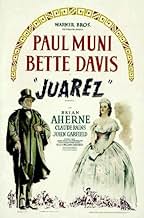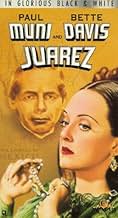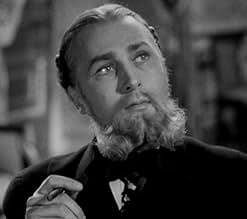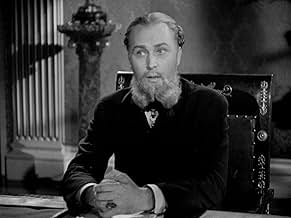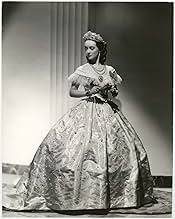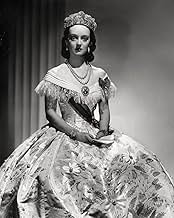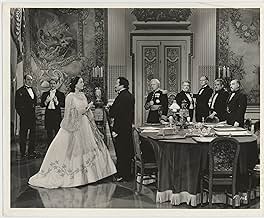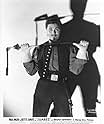Juarez
- 1939
- Tous publics
- 2h 5m
IMDb RATING
6.9/10
2.7K
YOUR RATING
Louis Napoleon III (Claude Rains) takes advantage of the American Civil War to circumvent the Monroe Doctrine and expand his power by helping Emperor Maximilian von Habsburg (Brian Aherne) t... Read allLouis Napoleon III (Claude Rains) takes advantage of the American Civil War to circumvent the Monroe Doctrine and expand his power by helping Emperor Maximilian von Habsburg (Brian Aherne) to add Mexico to his empire.Louis Napoleon III (Claude Rains) takes advantage of the American Civil War to circumvent the Monroe Doctrine and expand his power by helping Emperor Maximilian von Habsburg (Brian Aherne) to add Mexico to his empire.
- Nominated for 1 Oscar
- 3 wins & 1 nomination total
Featured reviews
This is one of five biopics that William Dieterle made for producer Hal B. Wallis at Warner Bros in as many years and the third to star Paul Muni in the title role. Excellent production values suffice it to say. Tony Gaudio is behind the camera and there is a symphonic score by Korngold arranged and orchestrated by Hugo Freidhofer with an effective use of 'La Paloma'.
Film historian David Thompson has dismissed these biopics as being Germanic and stagey. He is fully entitled to his opinion of course but I think his verdict to be harsh especially when one considers the first class actors, both leading and supporting, who appeared in these films.
The characters that linger longest in the memory from this are those of Brian Aherne as Maximilian and Bette Davis as his wife Carlotta. Aherne has never been better quite frankly while Davis is absolutely stupendous in the role. Their scenes together are beautifully understated and the scene where she confronts the ignominious Louis Napoleon, played with relish by Claude Rains, is magnificent. Her descent into madness is subtly handled.
Interesting also to see as future president Diaz that human dynamo John Garfield whose greatest roles were still to come.
Paul Muni I must confess has never really been my cup of tea but that is only my opinion.
The 'execution' of monarchs understandably has always caused more emotional outrage and controversy than that of dictators.
In this film at any rate Juarez feels remorse but his refusal to grant Maximilian a pardon is certainly a blot on his historical reputation.
Excellent film by a European director who adapted to and thrived under the Hollywood system.
As an historical document it is certainly off-centre in many respects but as a piece of entertainment it certainly hits the mark.
What drew me into seeing Juarez in the first place were the cast and that Korngold wrote the music. And while it is far from perfect, there are definitely a lot of good things. It does look exquisite, not just in the lavishly rendered costumes and sets but also in the sweeping cinematography. Korngold's score is splendid also, full of the rich and rousing melodies he is famous for, if not quite on the same level as the scores he did for Prince and the Pauper, Captain Blood, The Sea Hawk and especially The Adventures of Robin Hood. The Mexican history is interesting and I did find it informative, and most of the acting is fine. In particular Bette Davis who is very compelling in her role, Brian Aherne's dignified Maximillian and Claude Rains who plays urbane better than anyone(except perhaps Cary Grant). Donald Crisp, Montagu Love and Joseph Calleia are excellent also. However there are debits, while the script is mostly literate it also suffers from being too talky and trying to tell us too much. The film is perhaps overlong, and is rather tedious in the pace at times. And two actors unfortunately didn't work for me. Paul Muni, wonderful in Scarface, The Good Earth and The Life of Emile Zola, not helped by very heavy make-up is far too stoic and stiff in the lead. And while he tries hard to give the honest intensity the small role of Porfirio Diaz, John Garfield just ended up being out of place. On the whole, a great cast, a splendid score and lavish production values are definite things to like, but Juarez is spoilt sadly by bad pacing, too much talk and two actors who don't convince as much as they should. 6/10 Bethany Cox
Brian Aherne, as the Emperor Maximillian, is the strongest thing going for this historical film depicting the failed attempt by Louis Napoleon to create a puppet government in Mexico. The rest of the casting is uneven at best. John Garfield is badly miscast as Diaz, as is that great character actor Donald Crisp. Paul Muni playing the Zapotac Indian, Benito Juarez, manages to just look stoic and sullen and is not called upon to do much acting. Maybe it's the makeup! Claude Rains and Gale Sondergaard are outstanding as Napoleon III and his queen Eugenie and they play at the devious political game with just the right amount of intrigue.
The film is historically correct and that is part of the problem. The filmmakers put every incident that led to the fall of Maximillian into the story and the film drags on and on. It's more information that we need to know.
There are mixed opinions on the Bette Davis portrayal of Empress Carlotta, the unstable wife of Maximillian. Hers is an interesting story but Davis may not have put enough incipient madness into her characterization.
On the whole,this is a pretty good history lesson with no Hollywood happy ending tacked on, that tells of a well meaning, gentle man who was badly used by the French emperor, sent to rule a people of whom he knew nothing, in a land where he was not wanted. And Aherne absolutely is perfect for the part.....he is the star of this film.
The film is historically correct and that is part of the problem. The filmmakers put every incident that led to the fall of Maximillian into the story and the film drags on and on. It's more information that we need to know.
There are mixed opinions on the Bette Davis portrayal of Empress Carlotta, the unstable wife of Maximillian. Hers is an interesting story but Davis may not have put enough incipient madness into her characterization.
On the whole,this is a pretty good history lesson with no Hollywood happy ending tacked on, that tells of a well meaning, gentle man who was badly used by the French emperor, sent to rule a people of whom he knew nothing, in a land where he was not wanted. And Aherne absolutely is perfect for the part.....he is the star of this film.
Mexican History has not done too well in American cinema. One film (that I am aware of) about Cortez (THE CAPTAIN FROM CASTILE), one Yul Brynner movie about the Aztecs, several films about Santa Anna and the Alamo (including a new one coming out this week), a few films about Pancho Villa (the two most notable ones being VIVA VILLA with Wallace Beery and a film with Telly Savalas as the bandit patriot), one film directed by Elia Kazan, starring Brando and Quinn (who was half Mexican) about Emilianno Zapata, and John Ford's indictment (via Graham Greene's novel) of the anti-Catholicism of the Mexican Revolution. It's not much, and other films set in Mexico tend to promote the image of corruption and incompetence or bloody mindedness. Witness films like THE OLD GRINGO (an account of the end of Ambrose Bierce in the Mexican Revolution), or THE TREASURE OF SIERRA MADRES.
JUAREZ was a possible exception, in that it was to chronicle the odd events of 1862 - 1867 when (in the shadow of the American Civil War, and the temporary inability of the U.S. Government to exercise the Monroe Doctrine)Emperor Napoleon III decided to set up a puppet Hapsburg Emperor, Archduke Maximillian to rule Mexico. The film is supposed to be centered on Benito Juarez, Mexico's greatest liberal and President (his closest 20th Century counterpart is Lazaro Cardenas, who tried to get real land reform into the country). The film shows how Napoleon's scheme unravelled due to Juarez's refusal to accept the French occupation (an early version of the Vietnam War drained French troop strength for five years), as well as the returning threat of American intervention after Lee's defeat in 1865. But worst of all was the choice of the puppet. Maximillian was one of history's dreamers - he believed in the responsibility of royalty to govern for their people, and he was (for a Hapsburg) a liberal. The result was that the scheme was doomed from the start.
The real heart of the film is the competition between Juarez and Maximillian for the hearts of Mexico - both presenting conflicting views of government (but, ironically enough, good government). Because he was a foreigner, tainted by the French army supporting him, Max lost, and he ended up shot by a firing squad (he refused an opportunity to flee). His beloved wife Carlotta (Bette Davis in the film) went insane - dying in 1927 in Belgium, some sixty years after he died). Played by Brian Ahearn, Maximillian is a sympathetic man who pursues a tragic view of duty to it's sad conclusion. Davis shows the intense love of the doomed wife of this doomed man.
The problem is Muni. His performance is stiff, but good - especially when he explains democracy to his leading "Hotspur" military supporter -a young Porfirio Diaz (John Garfield). Garfield, having gotten to know Ahearn is a good guy, tries to convince Muni to join forces (becoming the first minister to the Constitutionally minded Ahearn). Muni rejects it - why have a monarchy at all. But Muni is overlooking the finer shadings of his rival's personality - he isn't Napoleon III but Maximillian. This should have been the center of the film - but it ended on the cutting room floor. The film was too long, and so Muni is shown struggling alone, leading his guerrilla war against the invader, and fighting an unscrupulous attempt by his Vice President to overthrow him (a properly corrupt Joseph Calliea). The conflict between constitutional monarch and democratic leader is skirted. Garfield, by the way, is not so bad as Diaz - he actually was to play a stronger part had the film not been cut - he would have been confronting the aging Juarez at the end (as historically he did) as the dictator of the future who ruled Mexico for 30 years, and gave it more stability and economic growth than any other leader in it's history (while selling the country off to American and European investors). The film was supposed to end on a more sour note. If it had, it would have been a great film.
JUAREZ was a possible exception, in that it was to chronicle the odd events of 1862 - 1867 when (in the shadow of the American Civil War, and the temporary inability of the U.S. Government to exercise the Monroe Doctrine)Emperor Napoleon III decided to set up a puppet Hapsburg Emperor, Archduke Maximillian to rule Mexico. The film is supposed to be centered on Benito Juarez, Mexico's greatest liberal and President (his closest 20th Century counterpart is Lazaro Cardenas, who tried to get real land reform into the country). The film shows how Napoleon's scheme unravelled due to Juarez's refusal to accept the French occupation (an early version of the Vietnam War drained French troop strength for five years), as well as the returning threat of American intervention after Lee's defeat in 1865. But worst of all was the choice of the puppet. Maximillian was one of history's dreamers - he believed in the responsibility of royalty to govern for their people, and he was (for a Hapsburg) a liberal. The result was that the scheme was doomed from the start.
The real heart of the film is the competition between Juarez and Maximillian for the hearts of Mexico - both presenting conflicting views of government (but, ironically enough, good government). Because he was a foreigner, tainted by the French army supporting him, Max lost, and he ended up shot by a firing squad (he refused an opportunity to flee). His beloved wife Carlotta (Bette Davis in the film) went insane - dying in 1927 in Belgium, some sixty years after he died). Played by Brian Ahearn, Maximillian is a sympathetic man who pursues a tragic view of duty to it's sad conclusion. Davis shows the intense love of the doomed wife of this doomed man.
The problem is Muni. His performance is stiff, but good - especially when he explains democracy to his leading "Hotspur" military supporter -a young Porfirio Diaz (John Garfield). Garfield, having gotten to know Ahearn is a good guy, tries to convince Muni to join forces (becoming the first minister to the Constitutionally minded Ahearn). Muni rejects it - why have a monarchy at all. But Muni is overlooking the finer shadings of his rival's personality - he isn't Napoleon III but Maximillian. This should have been the center of the film - but it ended on the cutting room floor. The film was too long, and so Muni is shown struggling alone, leading his guerrilla war against the invader, and fighting an unscrupulous attempt by his Vice President to overthrow him (a properly corrupt Joseph Calliea). The conflict between constitutional monarch and democratic leader is skirted. Garfield, by the way, is not so bad as Diaz - he actually was to play a stronger part had the film not been cut - he would have been confronting the aging Juarez at the end (as historically he did) as the dictator of the future who ruled Mexico for 30 years, and gave it more stability and economic growth than any other leader in it's history (while selling the country off to American and European investors). The film was supposed to end on a more sour note. If it had, it would have been a great film.
Well appointed but lumbering, miscast drama. Bette is fine, all spit and fire but John Garfield, who was embarrassed by his forced casting, is completely out of place as Porfirio Diaz with his New York accent still firmly in place. Paul Muni, a very fine actor in modern dress roles, does what he always does when heavily made up; he lets the makeup do the acting for him. The best performance is delivered by Brian Aherne but he is hampered by a bizarre beard which distracts the viewer whenever he's on screen. The lack of fluid direction makes this feel more like a history lesson than a dramatized story of an actual series of events. A good try but stodgy.
Did you know
- TriviaBecause the film shows a number of Maximilian's generals to be Mexican, many viewers attribute it to typical Hollywood historical distortions. It is, however, indeed accurate. It's a little-known fact that, although Maximilian was eventually overthrown and executed by Mexican revolutionaries, there were more Mexicans fighting on Maximilian's side than against him. This was due in large part to the Catholic Church's strong support of the French occupation of Mexico and its encouraging of Mexican Catholics to fight against the revolutionary forces by joining Maximilian's army, which they did in large numbers.
- GoofsWhen Napoleon III is informed in a letter that Robert E. Lee has been defeated at Gettysburg, he responds by paraphrasing Lincoln's famous Gettysburg Address by calling democracy as government for the people, by the people, etc. He couldn't have known Lincoln's speech flourish because it wasn't given until November 19, 1863, more than four months after the battle.
- Quotes
Emperor Louis Napoleon III: Democracy! Government of the cattle, by the cattle, for the cattle!
- Alternate versionsIn 1952, the film was re-released and several key scenes were removed, particularly sequences that contained dialogue that criticized countries which, in 1939 had been regarded as totalitarian, but which, by the early 1950s had become Cold War allies of the United States and could therefore no longer be criticized as imperialist adventurers. Germany and Italy, especially, former enemies in the 1940s, were now the cornerstone of NATO. The removal of these scenes obfuscated the narrative considerably, in particular, removing any clear reasons behind the execution of the Emperor Maximilian at the conclusion of the film. This revised print runs 106 minutes and is the version released on video and generally available today. The 1939 version is preserved on nitrate stock in the Warner Archive.
- ConnectionsFeatured in Hollywood and the Stars: The Angry Screen (1964)
- SoundtracksMy Country Tis of Thee
(uncredited)
Music attributed to Henry Carey (1744)
Played as part of the score when America is mentioned
- How long is Juarez?Powered by Alexa
Details
- Release date
- Country of origin
- Languages
- Also known as
- Maximilian and Carlotta
- Filming locations
- Warner Ranch, Calabasas, California, USA(Photographs)
- Production company
- See more company credits at IMDbPro
- Runtime
- 2h 5m(125 min)
- Color
- Sound mix
- Aspect ratio
- 1.37 : 1
Contribute to this page
Suggest an edit or add missing content


